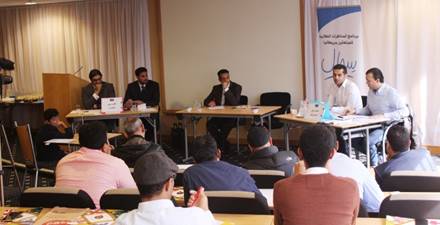SDG 16 in Saudi Arabia: Peace, Justice, and Strong Institutions
Sustainable Development Goal 16 (SDG 16) focuses on promoting peaceful, just, and inclusive societies; providing access to justice for all; and building accountable, transparent, and effective institutions. In Saudi Arabia, SDG 16 aligns with the country’s broader reform agenda under Vision 2030, which aims to enhance governance, transparency, and the rule of law.
Saudi Arabia’s Approach to SDG 16
Judicial Reforms and Legal Frameworks:
Saudi Arabia has made significant strides in reforming its judicial system to enhance access to justice and improve the efficiency of legal proceedings. Reforms include digitizing court procedures, reducing case processing times, and promoting transparency in legal rulings. The Ministry of Justice has implemented the Najiz online platform, which provides digital services for legal transactions, improving accessibility and efficiency in the judicial process.
Anti-Corruption Measures:
The Saudi government is committed to combating corruption as part of its Vision 2030 goals. The National Anti-Corruption Commission (Nazaha) plays a key role in investigating and preventing corruption within public and private institutions. Strict laws and regulations have been implemented to ensure accountability and integrity across government bodies, including high-profile crackdowns on corruption and financial mismanagement.
Human Rights and Legal Reforms:
Saudi Arabia is advancing human rights initiatives through legal reforms and the establishment of new institutions. The Kingdom has introduced laws protecting women's rights, labor reforms, and regulations to protect vulnerable groups. The establishment of the Human Rights Commission underscores the government's commitment to promoting and protecting human rights in line with Islamic values and international standards.
Public Sector Reforms and Governance:
Strengthening governance and accountability is central to Vision 2030. Reforms in the public sector, including the digitalization of services and enhanced transparency, have made government institutions more efficient and accessible to citizens. Initiatives such as the National Transformation Program (NTP) aim to improve institutional performance, reduce bureaucracy, and enhance service delivery.
Promoting Inclusiveness and Public Participation:
The government encourages civic engagement and public participation in decision-making processes. Platforms such as Etimad enable public input on government policies and initiatives, fostering inclusiveness and transparency. Additionally, municipal councils and forums are established to involve citizens in local governance and decision-making.
Peace and Security:
Saudi Arabia prioritizes national security and regional stability as part of its contribution to global peace and security. The country plays a key role in counterterrorism efforts and maintaining peace in the region. Domestically, the government has strengthened law enforcement, improved border security, and enhanced counterterrorism measures to ensure the safety and security of its citizens.
Majmaah University and SDG 16
Majmaah University contributes to SDG 16 by fostering a culture of good governance, promoting justice, and engaging in initiatives that strengthen institutions both within the university and in the broader community.
Promoting Ethical Leadership and Governance:
Majmaah University emphasizes ethical leadership and transparent governance within its institution. The university implements policies to ensure accountability and fairness in decision-making processes, promoting a transparent and inclusive environment for both students and staff. The focus on good governance aligns with SDG 16's emphasis on strong institutions and justice.
Legal and Human Rights Education:
The university offers educational programs that include courses on law, human rights, and governance. These programs equip students with knowledge of legal frameworks, justice systems, and the importance of human rights. By educating future leaders on these issues, Majmaah University contributes to building a society that values justice and the rule of law.
Community Engagement and Social Justice:
Majmaah University is involved in community outreach programs that promote social justice and inclusivity. The university organizes workshops, seminars, and forums to raise awareness about social justice, human rights, and the role of institutions in maintaining peace and security. These initiatives foster civic responsibility and encourage active participation in societal improvement.
Research on Governance and Justice:
Through its research initiatives, Majmaah University contributes to the understanding of governance, legal systems, and institutional development. Research on issues such as corruption prevention, legal reforms, and human rights helps to inform policies and strategies that strengthen institutions at both the local and national levels.
Fostering Peace and Inclusivity on Campus:
The university promotes a peaceful and inclusive environment by encouraging dialogue, tolerance, and understanding among students from diverse backgrounds. Programs and activities focused on conflict resolution, peacebuilding, and inclusivity help create a campus culture aligned with the values of SDG 16. This fosters a respectful and harmonious community where diversity is celebrated.
Partnerships with Legal and Government Institutions:
Majmaah University collaborates with government bodies, legal institutions, and human rights organizations to enhance its impact on governance and justice. These partnerships provide students with opportunities to engage in internships, training, and real-world experiences in law and governance, reinforcing the university’s commitment to SDG 16.
SDG 16 is essential for building peaceful, just, and inclusive societies, and Saudi Arabia is making significant progress through judicial reforms, anti-corruption efforts, and strengthening public institutions. The government's focus on transparency, accountability, and human rights reflects its commitment to achieving this goal as part of Vision 2030.
Majmaah University contributes to SDG 16 by promoting ethical governance, educating students about justice and human rights, engaging in research, and fostering a peaceful and inclusive campus environment. The university's efforts in community outreach and partnerships with government institutions further support the development of strong, accountable institutions, contributing to the Kingdom's broader goals of peace, justice, and good governance.
MU RECTOR CHAIRS THE 4TH SESSION OF THE CONFERENCE ‘THE ROLE OF SAUDI UNIVERSITIES AND THEIR IMPACT ON THE PROTECTION OF YOUTH AGAINST EXTREMISM’
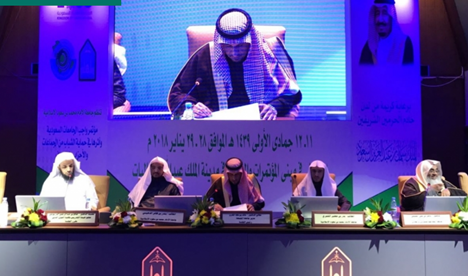
Under the patronage of the Custodian of the Two Holy Mosques King Salman bin Abdul-Aziz, the Minister of Education Dr. Ahmed bin Mohammed Al-Issa inaugurated the conference titled “The Role of Saudi Universities and their Impact on the Protection of Youth against Extremism”. The 2-days conference, organized by Imam Muhammad bin Saud Islamic University, addressed a number of topics, most importantly, the role played by Faculty of Theology in fighting extremism, defining the say ‘ the end justifies the means’ and how this was misinterpreted by Muslim Brotherhood and the impact of correcting rulers publicly. Dr. Al-Mugren said that all Saudi universities are obligated to take part in educating the public against extremism and dogma.
Student Clubs
https://m.mu.edu.sa/en/deanships/deanship-of-student-affairs/181746
Student Clubs at MU are set up to allow students to do their hobbies and to explore their talent in different fields to build up their personality. Some of these clubs are:
- Reading club
- Volunteer club
- Media club
- Scout club
- Theater club
Sustainable Development Club
https://m.mu.edu.sa/en/deanships/deanship-of-student-affairs/212316
Welcome to the official website of the Sustainable Development Club at Majmaah University. This page aims to make the communication process between our members and visitors much easier. The page also provides you with a highlight about the club’s members and activities.
The Club seeks to promote the concept of sustainable development and create a sustainable environment through collective work.
Our mission is to effectively utilize the resources available from each club member and boost the members' confidence.
Head of the Sustainable Development Club
Vision:
We seek to encourage and promote the culture of sustainability and environmental awareness among students and stimulate active participation in activities and initiatives that contribute to preserving the environment and promoting sustainable development in the university community.
Mission:
We strive to achieve a sustainable lifestyle and promote social responsibility among students at Majmaah University. We aim to be pioneers in organizing events and projects that contribute to preserving the environment and enhancing awareness of sustainability.
Goals:
- Promote awareness of sustainability among university members.
- Encourage a sustainable lifestyle on campus.
- Contribute to relevant environmental and social projects.
- Motivate research and innovation in the areas of sustainability.
- Develop a platform for exchanging ideas and experiences on sustainability topics.
Majma'ah University Filipino Students Association
https://www.facebook.com/mufsa/
MUFSA is an organization founded and established by Filipino students in Majma’ah University in 2020. This page is a platform to reach out to organization’s audience through contents that reflect Islamic values, ideals, and principles.

Anti-bribery and Corruption Policy at Majmaah University
https://m.mu.edu.sa/sites/default/files/content/2020/10/General%20Student%20Handbook.pdf
https://m.mu.edu.sa/ar/news/general/186776
1.Introduction
Majmaah University is committed to upholding the highest standards of integrity, transparency, and ethical conduct. This Anti-Bribery and Corruption Policy outlines the university's stance against bribery and corruption in all its forms and applies to all employees, students, third-party contractors, and anyone else acting on behalf of the university.
2. Policy Statement
2.1 Prohibition of Bribery and Corruption
Majmaah University strictly prohibits any form of bribery, corruption, or improper influence in any aspect of its operations. This includes offering, giving, receiving, or soliciting bribes, whether in monetary or non-monetary form, to gain an unfair advantage or influence any decision-making process.
2.2 Applicability
This policy extends to all activities conducted by or on behalf of Majmaah University, both within and outside the Kingdom of Saudi Arabia.
3. Key Principles
3.1 Integrity and Honesty
All employees, students, and stakeholders must act with honesty, integrity, and fairness in all interactions and transactions related to the university.
3.2 Compliance with Laws and Regulations
Everyone associated with Majmaah University must comply with all applicable anti-bribery laws and regulations, including the Kingdom of Saudi Arabia's Anti-Bribery Laws and international standards.
3.3 No Tolerance for Corruption
Majmaah University has a zero-tolerance approach to corruption. Any involvement in corrupt activities, whether directly or indirectly, will result in severe disciplinary action, including termination of employment or academic expulsion, and possible legal consequences.
3.4 Gifts, Hospitality, and Entertainment
Gifts, hospitality, and entertainment should never be used or accepted as a means to gain an unfair advantage or influence. Token gifts of nominal value, promotional items, or reasonable business entertainment are acceptable, provided they are proportionate and do not violate any laws or ethical standards.
3.5 Reporting Mechanisms
Majmaah University encourages all employees, students, and stakeholders to report any suspected or witnessed instances of bribery or corruption promptly. The university ensures that all reports will be treated with confidentiality and investigated impartially.
4. Responsibilities
4.1 Management Responsibilities
The university's management is responsible for implementing, communicating, and enforcing this policy. They must also ensure that employees and students receive appropriate training and awareness programs related to anti-bribery and corruption.
4.2 Employees and Students Responsibilities
All employees and students have a duty to familiarize themselves with this policy and adhere to its provisions. They must report any concerns related to bribery or corruption promptly and cooperate fully with any investigations.
5. Training and Awareness
Majmaah University will conduct regular training and awareness programs to educate employees, students, and stakeholders about the policy's content and significance.
6. Consequences of Non-Compliance
Non-compliance with this policy will result in appropriate disciplinary action, which may include termination of employment, academic expulsion, or other legal measures as warranted.
7. Policy Review
This policy will be reviewed periodically to ensure its relevance and effectiveness in combating bribery and corruption. Amendments will be made as necessary to reflect changes in laws, regulations, or best practices.
Majmaah University is firmly committed to maintaining an ethical, transparent, and corruption-free environment. This Anti-Bribery and Corruption Policy serves as a guiding framework to foster a culture of integrity and uphold the reputation and values of the university.
MU COUNCIL HOLDS THIRD MEETING FOR ACADEMIC YEAR 1445
https://www.mu.edu.sa/en/news/general/207841
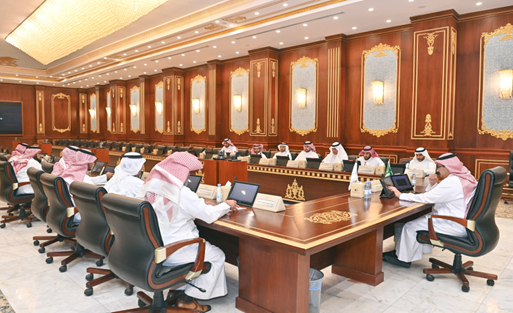
On behalf of the minister of education, Prof. Yousef al-Benyan - Chairman of MU'S Council -, Prof. Saleh al-Mezal, MU's rector, chaired the third meeting of the university council for the academic year 1445 in the presence of the general secretary of universities affairs council, Dr. Bassam al-Bassam, vice-rectors and deans of colleges and deanships.
In a welcoming speech by MU's rector, Prof. Al-Mezal extended his congratulations to Prof. Ahmed al-Rumaih, for his new position as the rector of Northern Borders University. He also congratulated Prof. Musallam al-Dosari for being assigned as the vice-rector for development and investment, Prof. Mohammed al-Shehri, for being assigned as a vice-rector for graduate studies and scientific research, and Dr. Osama al-Tamami, for being assigned as the dean of Institute of Studies and Consulting Services.
The General Secretary of the Council, Prof. Mohammed al-Shehri, pointed out that several topics in the agenda were addressed, including the recommendations made by the Permanent Committee for Teaching Assistants, Lecturers, Language Teachers and Research Assistants and the semi-annual report of Audit Committee during the period from January 1st, 2023 to June 30th, 2023.
The council members also discussed the request for approval of the projects carried out by the Institute of Studies and Consulting Services - Group Nine - for the year 2023.
At the end of the meeting, the rector extended his thanks to the council members for their active role in improving the quality of the university outcomes.
PROF. AL-SHEHRI ASSIGNED AS A VICE-RECTOR FOR GRADUATE STUDIES AND SCIENTIFIC RESEARCH
https://www.mu.edu.sa/en/news/general/207536
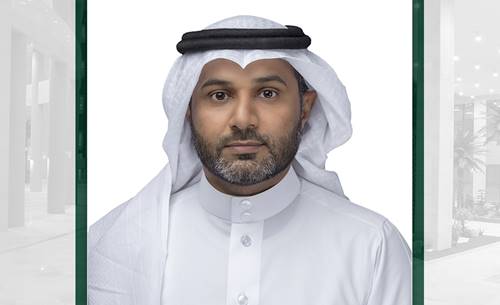
MU's rector, Prof. Saleh al-Mezal, issued a decision to assign Prof. Mohammed al-Shehri, as the vice-rector for graduate studies and scientific research. Prof. Al-Shehri is excellent academically and administratively and has held several positions such as the vice-dean and later the dean of College of Computer Sciences. He has contributed in the development and achievement of success academically and administratively.
PROF. AL-DOSARI ASSIGNED AS A VICE-RECTOR FOR FOR DEVELOPMENT AND INVESTMENT
https://www.mu.edu.sa/en/news/general/207531
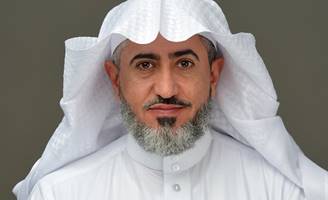
جامعة المجمعة
MU's rector, Prof. Saleh al-Mezal, issued a decision to assign Prof. Musallam a-Dosari, as a vice-rector for development and investment. Prof. Al-Dosari, is one of the excellent leaders who has played a significant role in the establishment of the university and its achievements locally and internationally.
Prof. Al-Dosari, extended his thanks to MU's rector for the trust which will encourage him to serve the university and to achieve its academic goals.
The Media Center's director congratulates Prof. Al- Shehri for being assigned as a vice-rector for graduate studies and scientific research
https://www.mu.edu.sa/en/news/centers-and-institutes/media-center/208286
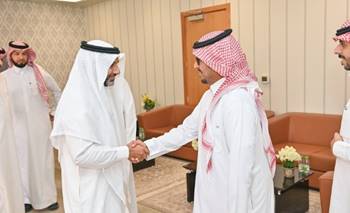
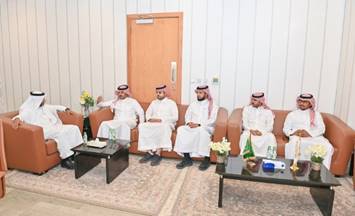
The director of the Media Center, Mr. Waleed Al-Mujali, accompanied by a number of the center’s staff, visited Prof. Muhammad Al-Shehri in his office, to congratulate him the new assignment as a Vice-Dean for Postgraduate Studies and Scientific Research, wishing him success in his future endeavors.
PROF. AL-DOSARI CONDUCTS A MEETING WITH A NUMBER OF DEANS
https://www.mu.edu.sa/en/news/general/204306
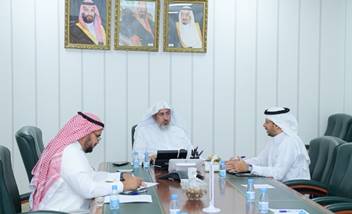
At the request of MU rector to consolidate the institutional practices which stem from the university's strategic plan, the advisor and supervisor of administrative, financial and technical affairs, Prof. Musallam Al-Dosari, held a virtual meeting with the deans of the College of Business Administration, College of Education and Applied College.
The meeting addressed the tasks that should be completed by colleges in the academic year 1445 AH. These tasks include reviewing the strategic plan in line with the changes being made to the development plans, following up the Deanship of Quality to match the plan indicators with the requirements specified by the departments, delivering the plan in the fourth week of the semester and setting a schedule by the Deanship of Development and Quality to complete all indicators in coordination with the Vice Rector.
Prof. Al-Dosari pointed out that all colleges should complete the required tasks according to the technical and time frame specified by the Vice-Rector's office. He reminded them to contact the Vice-Rector's Office in the event of any inquiry or clarification.
MU RECTOR WELCOMES MEMBERS OF FINAL ACCOUNT COMMITTEE
https://www.mu.edu.sa/en/news/general/203521
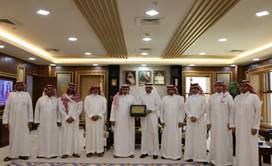
MU Rector welcomed in his office members of the final account committee led by the director of Administrative and Financial Affairs, Mr. Ahmed al-Mousa and the manager of financial department, Mr. Ahmed Al-Batel.
Mr. Al-Mousa briefed MU Rector about the final account which was finished on time.
MU Rector commended the role played by all members who prepared the final account.
Prof. Musallam Al-Dosari participates in the International Conference on Combating Cyber Terrorism
https://www.mu.edu.sa/ar/news/general/196546
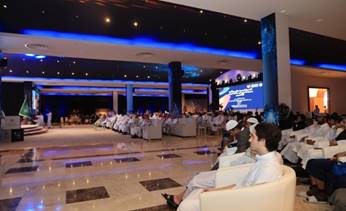
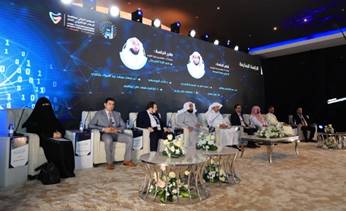
His Excellency Prof. Dr. Musallam bin Muhammad Al-Dosari participated in the International Conference on Combating Electronic Terrorism organized by the Islamic University in Madinah, by chairing the seventh session of the conference sessions, which was attended by speakers from the Arab Republic of Egypt, Morocco, Belgium and Macedonia, and His Excellency was honored at the end of the session by honoring the speakers and presenters of scientific papers, and His Excellency was honored by His Highness the President of the Islamic University, Prof. Dr. Mamdouh bin Saud Al Saud.
In this regard, His Excellency Prof. Dr. Musallam Al-Dosari stated that the importance of this conference comes through the importance of its topic, which came in the context of national universities playing their scientific and research role, and providing scientific studies that reveal the negative phenomena that threaten our societies, and it also provides recommendations that promote and support the decisions that can be taken by the relevant authorities.
On this occasion, His Excellency Prof. Dr. Musallam Al-Dosari thanked His Highness the President of the Islamic University, the Vice-Rectors of the University and all its employees for the invitation to participate in this conference and for the quality and good organization.
Student Advisory Council Elections
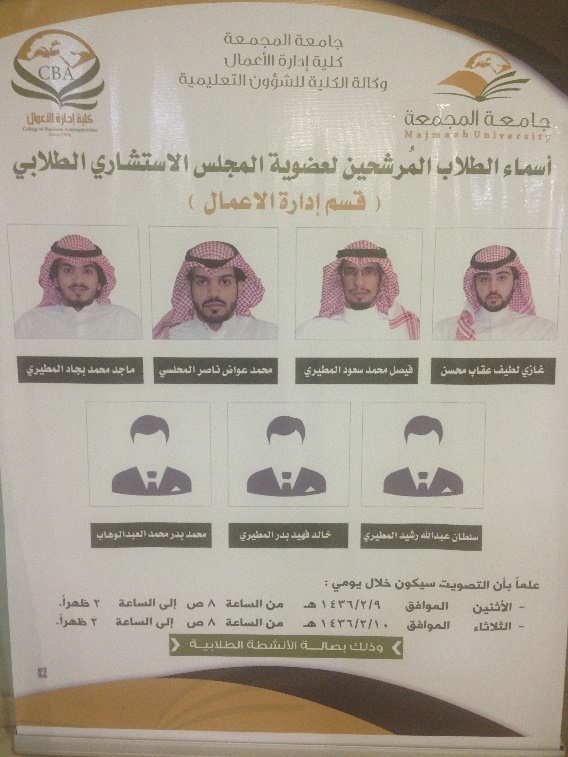
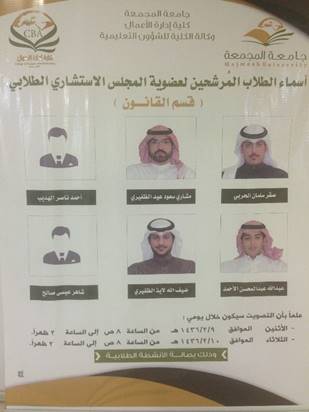
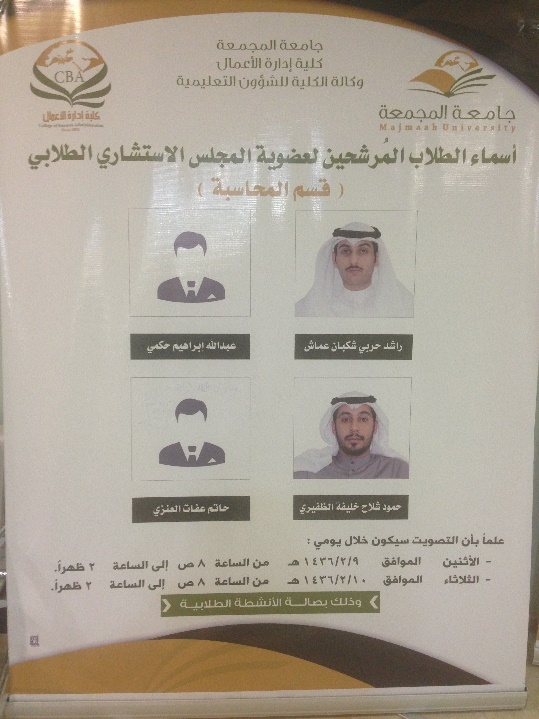
The College of Business Administration announces its announcement tomorrow, Wednesday, 11/2/1436 AH, the results of the names of the candidates of the departments for membership of the Student Advisory Council in the college, at its headquarters in Majmaah, the female section, and also the college divisions in Zulfi, and on this the college invites its students nominated for membership of the Council for the academic year 1435-1436 AH for all departments to know the results of the vote count, and the results will also be announced through the college's website.
Note that 34 male and female students from all disciplines have applied for nomination for membership of the Student Advisory Council, who met the conditions of applicants to the Student Advisory Council as follows:
- Majmaah headquarters students: (8 students of the Department of Business Administration - 4 students of the Department of Accounting - 6 students of the Department of Law).
- The headquarters of the complex female students: (6 students of the Department of Business Administration).
- Zulfi Campus Students: (9 students of the Department of Law - Student of the Department of Business Administration).
Two students representing the department will be selected for the three sections, two students will be selected at the college headquarters in Zulfi representing the college departments in Zulfi, and two students will be selected at the female headquarters in Majmaah to represent the rest of the students.
All this under the guidance and supervision of His Excellency the Dean of the College, Dr. Mohammed bin Abdullah Al-Jibreen, with our wishes for the candidates success and the best representation of their colleagues.
We will soon provide you with a detailed report on the stages of the elections with abundant photographs of the event.
The Deanship Holds the Advisory Board Elections
All students are requested to participate in the elections of the Student Advisory Council in the Deanship and to realize the importance and value of this Council in participating in decision-making in the Deanship in a way that serves the interest of the student first and foremost. The candidates' information is hung in the wall magazine at the entrance to the Deanship and voting in the guidance office on the third floor, and the last day of voting is next Thursday, corresponding to 23/2/1440 AH.
Preparatory Year
Vice Deanship for Student Affairs
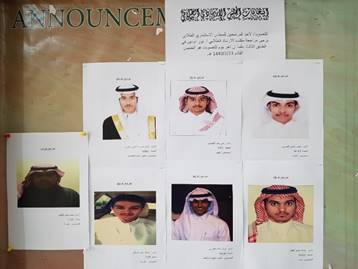
Your opinion is our focus
In a positive initiative, the College of Applied Medical Sciences, under the patronage of the supervisor of the college, His Excellency Dr. Fahad Al-Dhafiri, and the Vice Dean of the College, Her Excellency Dr. Amal Abdullah Al-Otaibi, held elections for the Student Advisory Council in both male and female sections, where these elections aim to discuss the desires of male and female students and their problem and transfer them to the administration of the Council and also aims to Rooting Shura in the college and such elections develop the leadership skills of male and female students and qualify them on student leadership while instilling the principles of dialogue and acceptance of opinion and opinion of the other also aims such programs to promote the principle of Shura in the hearts of male and female students as an Islamic principle administrative also works to develop leadership and administrative skills they have and open the way for them to participate in the issuance of decisions on the workflow in the college in their regard, and contribute to achieving discipline and informing the college administration of their desires And their observations through the reports of their sessions, and opening the field of dialogue and discussion between them to accept opinion and address the most prominent problems in which they fall. Where the male and female students nominated for the Council were selected through nominations from all male and female students in all departments of the college, and this Council will have complete independence for both male and female students and discuss issues that are referred to them by male and female students or proposed by the members of the Council themselves without interference from the supervisory or administrative authorities.
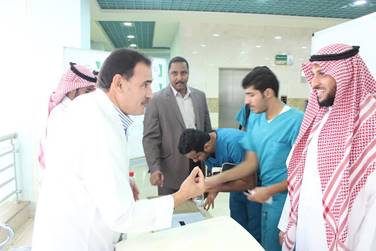
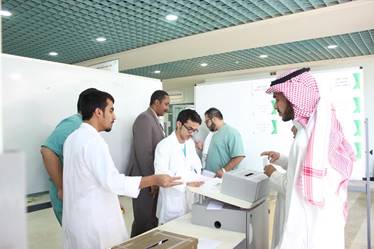
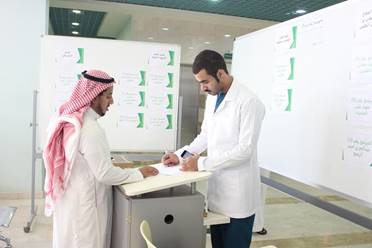
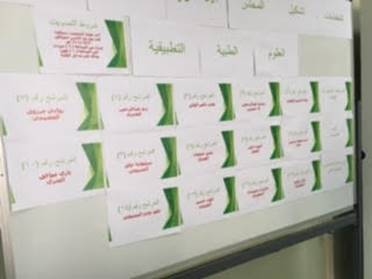
The scholar Al-Buqami participates in the third debate of the student debate program "Sajal"
https://www.mu.edu.sa/ar/news/33244
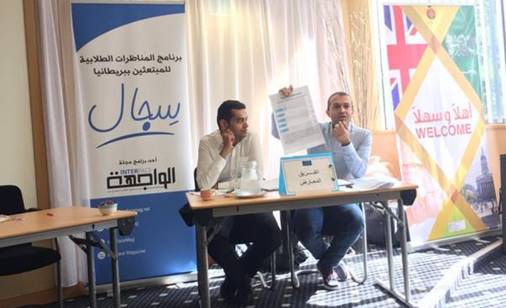
A number of scholarship students from the university offer clear efforts and various achievements in their various scholarship places, and they also represent the Saudi scholarship the most wonderful representation through their positive interaction in various community activities and others, in addition to their excellence and discipline in their studies, and among the university's distinguished scholarship students is Adi Al-Buqami, who is on scholarship from the College of Sciences and Human Studies in Ramah to study for a doctorate in the United Kingdom, where he worked as a volunteer in the British Heart Association, He participated in the tender program, which is supervised by the interface magazine of the Cultural Attaché in Britain, and is interested in the stories of volunteering, motivation and humanitarian aspects of scholarship students in their scholarship headquarters, and he talked about his volunteer experience in the British Heart Association and his participation in it, in order to invest his free time for the benefit of him, and he also participated with a number of scholarship students in the third debate of the student debate program "Sajal", which was under the title "A large number of Saudi universities and companies tend to prefer university graduates American colleagues from British universities under the pretext of scientific competence", which was hosted by the Saudi Club in the British city of Nottingham, where he put forward his point of view, and evidence to defend the subject of debate and refute the evidence, which included three rounds covered three axes: preference in employment, scientific competence, and the impact of the issue on the environment of scholarship and scholarships, and the program "Sajal" is one of the media activities of the student interface magazine issued by the Cultural Attaché in Britain, and the student activity is the first of its kind At the level of student activities in the scholarship headquarters, and aims to apply one of the most important concepts of dialogue through the art of debate, accept the other opinion, and develop the skill of the individual to persuade with argument and proof, as well as spreading the culture of debates among the scholarship students, and on the other hand and within the achievements of the scholarship Al-Buqami winning the candidacy for the presidency of the Saudi Club in Manchester after obtaining the majority of votes in the elections of the administrative bodies of Saudi clubs in Britain, Al-Buqami explained that the scholarship students are ambassadors of the homeland And future builders, and from this point of view, the plan of the Saudi Club in Manchester was built in its 35th session to include all aspects that support scholarship students and scholarships, and added that they will do in the club what they can in coordination with the attaché in overcoming all the difficulties facing students, and the establishment of all programs, courses, lectures and activities that support all members of the club, as well as the definition of various aspects of civilization of the Kingdom and its representation in all occasions and celebrations.
